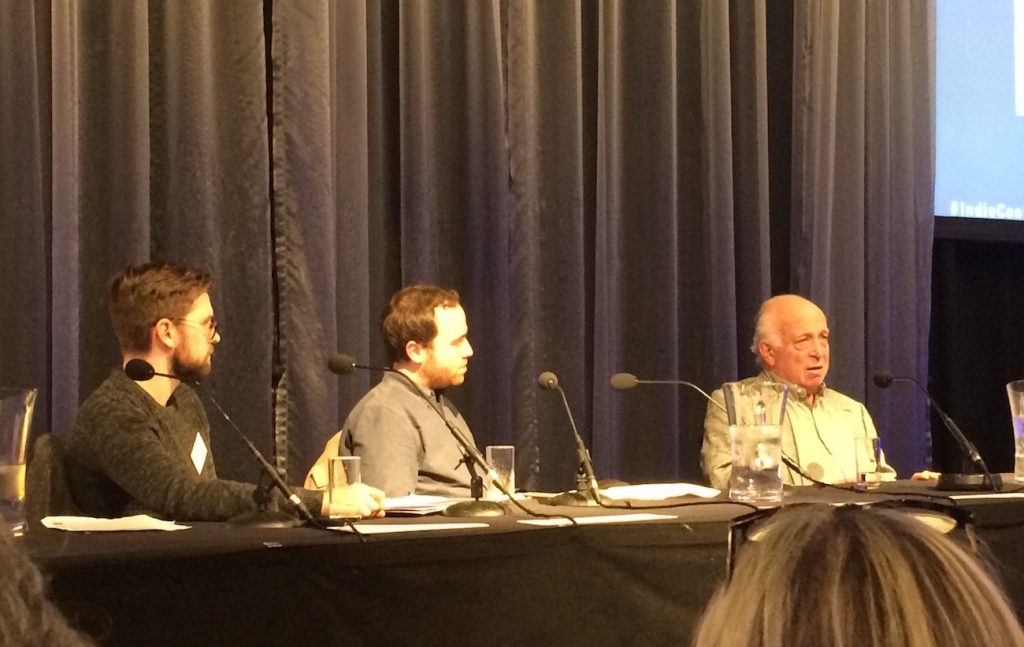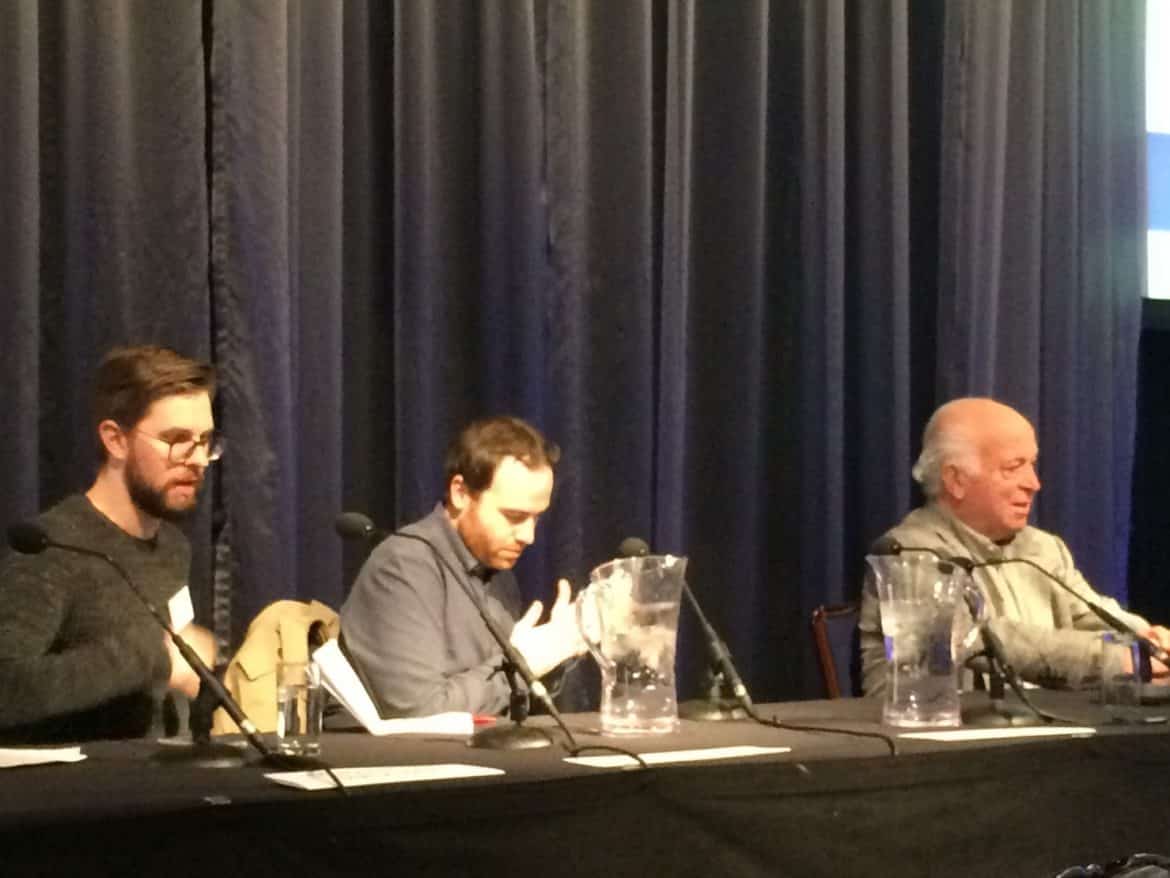The highlight of AIM’s Indie Con was undoubtedly the conversation with Seymour Stein, hosted by Tim Dellow and Toby L. of Transgressive Records. 2016 marks 50 years since Stein founded Sire Records, and he has since become instrumental in launching the careers of artists including Madonna, The Ramones, The Smiths, Talking Heads, and Depeche Mode. This is what the man himself had to say:
On the historical importance of independent labels:
“The indies are responsible for just about everything. One of the earliest proponents of jazz was Blue Note Records, it goes all the way back to 1939. Folk music goes back to companies like Elektra and Vanguard Records. Rhythm and blues, which was the main component of rock and roll, was exclusively represented by independent companies. Rock and roll was companies like Atlantic and Chess and King Records – all indies. There was Transatlantic Records which was sort of the English equivalent of what Vanguard and Elektra Records were doing, and then came Chrysalis, and Island, and Virgin, and then the next wave which started with Rough Trade, Beggars, and Mute.
My greatest mentors, who I certainly wouldn’t have got anywhere without – all but one of them were indie label people. Syd Nathan of King Records first and foremost, he was like a second father to me. Ahmet Ertegun and Jerry Wexler of Atlantic, Leonard Chess, and others. Nobody, in any way, can underrate the value of indies.”
On Talking Heads almost ruining his life for 11 and a half months:
“I’ll tell you a story that almost ruined my life for 11 and a half months. My wife (Linda Stein), ended up managing The Ramones, so they knew my every move. I came back from England, and after five minutes in the house the phone rings and it’s Johnny Ramone and he’s done some new songs. I said, “I just got home, give me one day and I’ll give you as much time as you need”. He says, “well we know you’re not doing anything on Wednesday, so we booked ourselves into CBGBs.”
So I go there and I’m standing outside, and all of a sudden I hear the opening act. The music, like a snake charmer, actually swept me into the room. It was Talking Heads. It was one of the greatest moments, to this day, of my life. When they finished, I ran over to them and David Byrne says, “why don’t you come round to our loft tomorrow?”, which I did. I offered them a deal on the spot, and it wasn’t until exactly 11 and a half months later I signed them. I tell you, it was the most tension that I ever had. Every night, going to sleep, wondering if someone else would find this fantastic band and offer them money that I didn’t have. But nobody did.”
On signing Madonna:
“There was this great guy Mark Kamins who did a lot of mixing for us, and he wanted to start making records. So I gave him some money to bring me stuff, and the third thing he brought me was Madonna. I was in the hospital at the time, and I liked it so much that I asked her to come to the hospital. She only had one track, but when I saw her walk in I could see the determination, and I did the deal with her right on the spot.”
On what made Sire Records so successful:
“I think, to a large extent, we were there early. I could go down to CBGBs – Richard Gottehrer (his Sire Records co-founder) signed Blondie there, I signed The Ramones. It wasn’t hard signing the bands. There wasn’t much competition, even with Madonna.”
“I didn’t have any money to sign big bands, so I tried to get into the ground floor and see bands before anybody else. I think that had a lot to do with it. Clive Davis would say to me, “what’s the attraction down in the Bowery? It’s all those bums sleeping in alleys.” And I’d say, “but you have Patti Smith, you must know what the Bowery is!” And then, when I saw what was happening in England with Beggars, Rough Trade, and Mute, I started going over there more and more.”
On growing up a music fan, getting into the business:
“I was a fan from early on. I grew up in Brooklyn in a small house, I had to share a bedroom with my older sister, and I heard a lot of the music that she loved. It happened to be at a period when country songs were starting to get covered by pop artists, so I heard a lot of Hank Williams covers. And I heard “The Tennessee Waltz”, written by Pee Wee King and Redd Stewart. Most people haven’t heard of them, but they wrote some of the most important songs – “Bonaparte’s Retreat” and “You Belong to Me”.
Then I heard some early Fats Domino and it knocked me out of my seat – I’d never heard anybody sing like that before, it was incredible. I just grew up loving music, and at an early age I knew that this is what I wanted to do. I had no talent – I couldn’t play an instrument, and I certainly couldn’t sing, but I just wanted to be in the business. So I went up to Billboard, and they let me do research. This was 1956 when rock and roll was exploding, and I met a lot of people at Billboard because they invited me to go to the listening sessions. In those days a Billboard review was so important, especially to an indie company. That’s how I first got recognized in the business. It worked out to be a golden opportunity for me, and I’m really grateful.”
On his love affair with England:
“I don’t understand, even after the Beatles, why people didn’t pay far more attention to England. To be honest, it was a very lucky break for me. The first time I came to London, I fell in love with the city and the country. When I saw exit signs, and they said “Way Out” – you know, “Way Out”! This has been an ongoing love affair for many, many years.”
On signing Depeche Mode:
“I met Geoff (Travis, Rough Trade founder), who is a great Ramones fan, and one day in the store I met Daniel Miller who gave me his record T.V.O.D. and I put it out.
And then I woke up one morning, thank god very early, and there was some little clip in the NME or the Melody Maker which said that Daniel had signed a band called Depeche Mode. So I picked up my passport and my credit card, ran to the airport, and got on the concorde. I got there in time and drove up to Basildon and I saw this fantastic band, Depeche Mode. Not only was the music good, but they were great live a well, and that’s what really hooked me.”
On genres:
“There’s no such thing as a genre: there’s good music, and there’s bad music. Genres really don’t help. The minute you start to put music into boxes, there’s less of a chance of it being big. It shouldn’t lessen any of is potential.”
On the world music market:
“What I see is that the music business is shrinking. I look at India and China, and if you include all of what India was, with Pakistan and Bangladesh, that’s 40% of the world’s population. These people love music too. I can remember when America was 60% of the world market. It isn’t now by far – more and more countries have come into it. I think India and China are going to become part of the world market, and that’s really why I spend a lot of time there. I think there are some geniuses in Bollywood who are writing music that they don’t love because that’s where the money is for them. It’s the same in China, there’s some really great bands, and I think it is going to widen the market.”
On his favourite music:
“I have some real crazy taste in songs – if I mentioned some of them somebody would come along with a net and pull me away. One of the songs that really inspires me so much is “La Marseillaise”, it’s hard to believe. Every time Casablanca is on, I know exactly what time that song comes on in the movie. “The Star-Spangled Banner” is great, I’m an American, I love it, and “God Save the Queen” is great too, but when I hear “La Marseillaise”, I want to jump on a horse with a sword and a gun – it’s one of my favourite songs. My favourite period is when country and rhymthm and blues came together to make rock and roll. The early days of Fats Domino, Chuck Berry, Ray Charles, Sam Cooke, Hank Williams, Little Richard. All of that.”
On the music industry in 2016:
“As far as I’m concerned, it’s the same, because it’s all about the music. How it’s transmitted, how it’s bought – the good things about it may be different, the bad things about it may be different, but it’s still – I mean, as Lincoln said, “You can fool some of the people all of the time, and all of the people some of the time, but you can not fool all of the people all of the time.” You’ve got to have good music.”
On one of his proudest moments:
“One of my proudest moments was when I was at Midem and I ran into somebody walking down the street who I knew from South Africa. He said, “Seymour you’ve got to hear this song”, and it was “Scatterlings of Africa” by Juluka. When I heard it I started to cry, it was so beautiful. It was a mixed racial band in the last days of apartheid, and I said, “I’ve got to have this record”. It didn’t do well in America or England, but it reached number one in France. To me it’s one of the most important records that I ever acquired because of the message that it had, and just the fact that they were even able to make it.”
On not stopping any time soon:
“Am I as active as I was 25 years ago? No, of course not, I’m 73 years-old, but I still travel a lot. I was just in Australia and I saw a band I wanted to sign. I get around.”

Tim Dellow and Toby L. of Transgressive Records with Seymour Stein, AIM’s Indie Con 2016
There’s no denying that Seymour Stein is a music industry legend, and a champion of the independent sector. But, above all else, he’s a true music fan. There’s probably no better way to end this article than with the following anecdote from a member of the Indie Con audience:
“Hi Seymour, I’m Rupert and I run a record shop called Drift. One day, a couple of years ago, my mum was running the shop for the day and when I came back she said, “a New Yorker phoned up today and he was talking about Talking Heads and Madonna, and he was called Seymour.” I think there had been a very small piece about us on the Al Jazeera network, and you’d seen it and made a transatlantic phone call just to say well done.”
